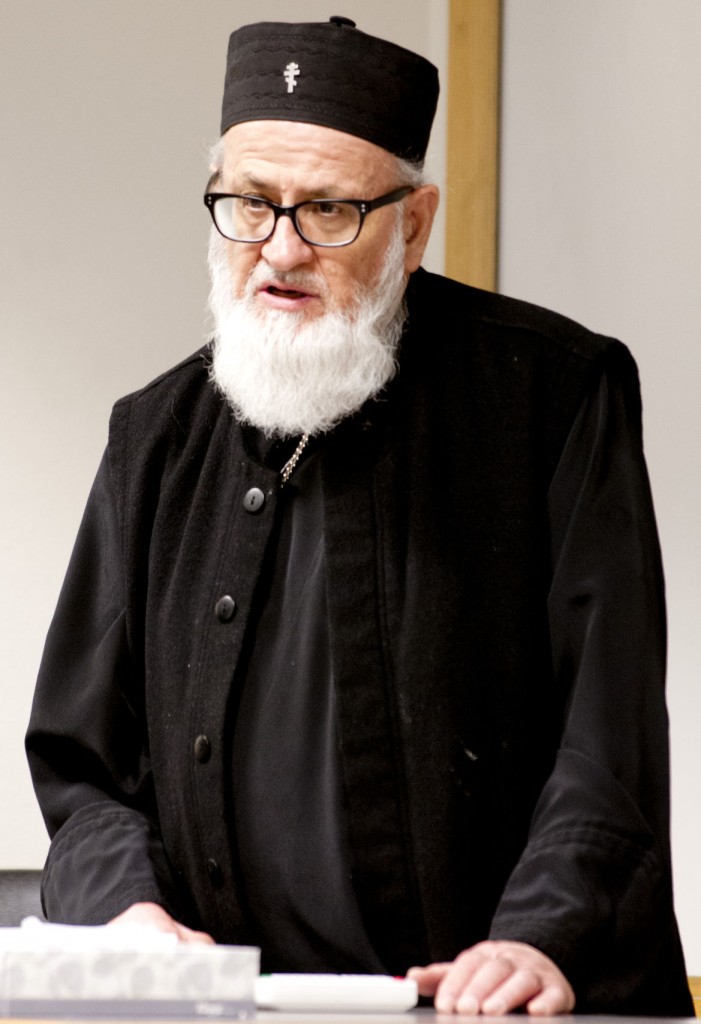
photo by John Zsiray
by Clayton Gefrey
As a young Greek immigrant raised in Melbourne, Australia in the 1960s, Themistocles Adamopoulos was once an atheistic rock star, a founding member of popular Australian group The Flies sharing the stage with the Rolling Stones.
It wasn’t until he entered his 20s that he found himself connected to God through what he called a mystical, metaphysical experience.
Today, Adamopoulos, better known as “Father Themi,” serves the people of Sierra Leone as the leader of the Holy Orthodox Mission, where he has spent the last year on the front lines of one of Africa’s epicenters for the ebola virus.
“Ebola has made worse the anxiety, fear and suspicion people hold for one another,” Adamopoulos told a crowd gathered Tuesday at Utah State University to hear him speak. “How do we cope? I tell them, ‘Don’t feel fear. Don’t be afraid.’”
Adamopoulos, a quintilingual with a masters degree in divinity from Boston’s Holy Cross Seminary and a Ph.D in theology from Brown University, was invited to USU to speak about his experiences in Sierra Leone, one of the world’s poorest countries. He discussed the state of the nation in the face of the ebola virus, which the World Health Organization reported has claimed nearly 4,000 lives in the country.
“Sierra Leone already has the challenge of poverty and destitute circumstances,” Adamopoulos said. “With ebola, there are now bodies left in the street, doctors and nurses fleeing, and a new stigma. Ebola is a disease that is like an atomic bomb inside of you going off. Once it explodes, there is no hope.”
Adamopoulos has lived in Africa for 17 years, first leading his mission in Sierra Leone 2008 in the midst of the nation’s civil war. He called Sierra Leone’s 11-year war as characteristic of man’s inhumanity towards their fellow man, a war which brought the entire nation to a standstill.
“I’ve come to believe it is man’s inevitable destiny to fight each other,” he said. “There is an entire generation that could not go to school, and at last, when we do see the light of the end of the war, we are struck with ebola.”
Inspired by the acts of Mother Theresa, Adamopoulous has used his mission in Sierra Leone to help assist those affected by the virus, distributing food, providing health education, establishing orphanages and holding regular religious services. With the aid of Australian-based nonprofit organization Paradise 4 Kids, the mission currently serves more than 2,000 people, keeping them from becoming infected through diligent precautionary measures.
“I’ve learned a number of things from ebola,” he said. “The first is how truly fragile we are as individuals, and how quickly we can fall ill. The second is the subliminal racism that I thought we had gotten beyond. Having lived in Africa for 17 years, I’ve seen how westerners inflict racism without knowing or wanting it. It was only the minute Americans and Europeans were infected that it was said ebola was a problem. It’s obscene.”
When asked by an audience member what kept him going through the nation’s adversity and continuing his mission to aid the poor, the response of the man known as the “Ebola Warrior” was instant: His belief in Jesus Christ.
“I believe He is real, that there is a kingdom of heaven, and that we’ve been promised life eternal,” he said. “I see the face of Christ as I look into the eyes of the desperate, the sick and the hungry. In the face of hopelessness, Christ provides hope.”